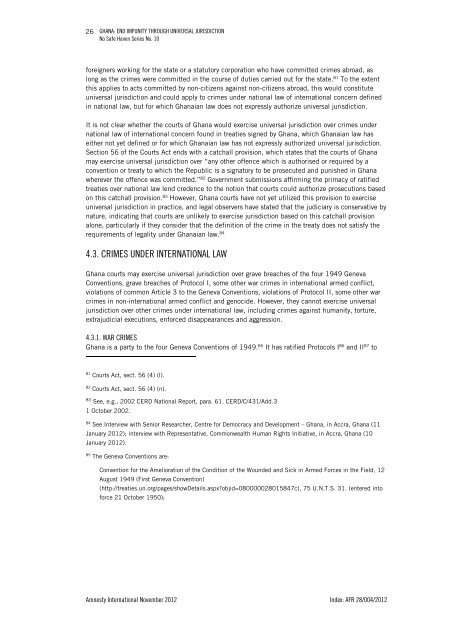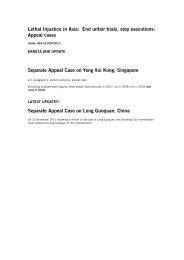Ghana - Amnesty International
Ghana - Amnesty International
Ghana - Amnesty International
You also want an ePaper? Increase the reach of your titles
YUMPU automatically turns print PDFs into web optimized ePapers that Google loves.
26GHANA: END IMPUNITY THROUGH UNIVERSAL JURISDICTIONNo Safe Haven Series No. 10foreigners working for the state or a statutory corporation who have committed crimes abroad, aslong as the crimes were committed in the course of duties carried out for the state. 81 To the extentthis applies to acts committed by non-citizens against non-citizens abroad, this would constituteuniversal jurisdiction and could apply to crimes under national law of international concern definedin national law, but for which <strong>Ghana</strong>ian law does not expressly authorize universal jurisdiction.It is not clear whether the courts of <strong>Ghana</strong> would exercise universal jurisdiction over crimes undernational law of international concern found in treaties signed by <strong>Ghana</strong>, which <strong>Ghana</strong>ian law haseither not yet defined or for which <strong>Ghana</strong>ian law has not expressly authorized universal jurisdiction.Section 56 of the Courts Act ends with a catchall provision, which states that the courts of <strong>Ghana</strong>may exercise universal jurisdiction over “any other offence which is authorised or required by aconvention or treaty to which the Republic is a signatory to be prosecuted and punished in <strong>Ghana</strong>wherever the offence was committed.” 82 Government submissions affirming the primacy of ratifiedtreaties over national law lend credence to the notion that courts could authorize prosecutions basedon this catchall provision. 83 However, <strong>Ghana</strong> courts have not yet utilized this provision to exerciseuniversal jurisdiction in practice, and legal observers have stated that the judiciary is conservative bynature, indicating that courts are unlikely to exercise jurisdiction based on this catchall provisionalone, particularly if they consider that the definition of the crime in the treaty does not satisfy therequirements of legality under <strong>Ghana</strong>ian law. 844.3. CRIMES UNDER INTERNATIONAL LAW<strong>Ghana</strong> courts may exercise universal jurisdiction over grave breaches of the four 1949 GenevaConventions, grave breaches of Protocol I, some other war crimes in international armed conflict,violations of common Article 3 to the Geneva Conventions, violations of Protocol II, some other warcrimes in non-international armed conflict and genocide. However, they cannot exercise universaljurisdiction over other crimes under international law, including crimes against humanity, torture,extrajudicial executions, enforced disappearances and aggression.4.3.1. WAR CRIMES<strong>Ghana</strong> is a party to the four Geneva Conventions of 1949. 85 It has ratified Protocols I 86 and II 87 to81Courts Act, sect. 56 (4) (l).82Courts Act, sect. 56 (4) (n).83See, e.g., 2002 CERD National Report, para. 61. CERD/C/431/Add.31 October 2002.84See Interview with Senior Researcher, Centre for Democracy and Development – <strong>Ghana</strong>, in Accra, <strong>Ghana</strong> (11January 2012); interview with Representative, Commonwealth Human Rights Initiative, in Accra, <strong>Ghana</strong> (10January 2012).85The Geneva Conventions are:Convention for the Amelioration of the Condition of the Wounded and Sick in Armed Forces in the Field, 12August 1949 (First Geneva Convention)(http://treaties.un.org/pages/showDetails.aspx?objid=080000028015847c), 75 U.N.T.S. 31. (entered intoforce 21 October 1950);<strong>Amnesty</strong> <strong>International</strong> November 2012 Index: AFR 28/004/2012
















